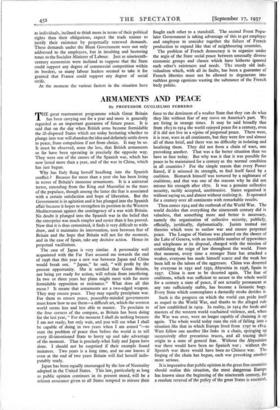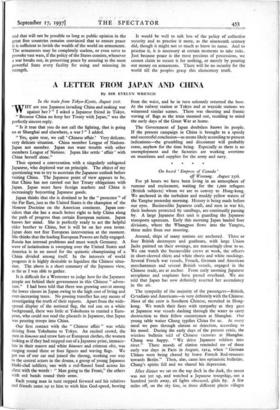ARMAMENTS AND PEACE
By PROFESSOR GUGLIELMO FERRERO
THE great rearmament programme which Great Britain has been carrying out for a year and more is generally regarded as an important guarantee of future peace. It is said that on the day when British arms become formidable the ill-disposed States which are today hesitating whether to plunge into war will abandon the idea and definitely settle down to peace, from compulsion if not from choice. It may be so. It must be observed, none the less, that British armaments so far have been operating in precisely the opposite way. They were one of the causes of the Spanish war, which has now lasted more than a year, and of the war in China, which has just begun.
Why has Italy flung herself headlong into the Spanish conflict ? Because for more than a year she has been living in terror of Britain's immense armaments. It is a universal terror, extending from the King and Mussolini to the mass of the populace, though among the latter the fear is associated with a certain satisfaction and hope of liberation. But the Government is in agitation and it has plunged into the Spanish affair because it hopes to strengthen its position in the Western Mediterranean against the contingency of a war with Britain. No doubt it plunged into the Spanish war in the belief that the enterprise was much simpler and easier than it has proved. Now that it is thus committed, it finds it very difficult to with- draw, and it maintains its intervention, torn between fear of Britain and the hope that Britain will not for the moment, and in the case of Spain, take any decisive action. Hence its perpetual vacillations.
The case of Japan is very similar. A personality well acquainted with the Far East assured me towards the end of 1936 that this year a new war between Japan and China would break out. " Japan," he said, " will profit by the present opportunity. She is satisfied that Great Britain, not being yet ready for action, will refrain from interfering. In two or three years her plans might meet with far more formidable opposition or resistance." What does all this mean ? It means that armaments are a two-edged weapon. They may ensure peace. They may equally precipitate war. For them to ensure peace, peaceably-minded governments must know how to use them—a difficult art, which the western world seems less and less able to master. To proclaim to the four corners of the compass, as Britain has been doing for the last year, " For the moment I shall do nothing because I am not ready, but only wait, and you will see what I shall be capable of doing in two years when I am armed "—to state the problem of peace thus before the world is to tell every ill-intentioned State to hurry up and take advantage of the moment. That is precisely.what Italy and Japan have done. I should not be surprised if their example found imitators. Two years is a long time, and no one knows if even at the end of two years Britain will feel herself indis- putably ready.
Japan has been equally encouraged by the law of Neutrality adopted in the United States. This law, particularly as long as public opinion continues in its present mood, will be a solemn assurance given to all States tempted to misuse their force to the detriment of a weaker State that they can do what they like without fear of any move on America's part. We are living in strange times. It may be said broadly that from 1815 to 1914 the world enjoyed peace for a century, even if it did not live in a regime of perpetual peace. There were, it is true, wars in all continents, but they were few and almost all of them brief, and there was no difficulty in isolating and localising them. They did not form a chain of wars, one provoking another. That was a far better situation than we have to face today. But why was it that it was possible for peace to be maintained for a century as the normal condition in all countries ? For the simple reason that every Power feared, if it misused its strength, to find itself faced by a coalition. Bismarck himself was tortured by a nightmare of coalitions, and that was one of the reasons why he did not misuse his strength after 1870. It was a genuine collective security, tacitly accepted, unobtrusive. States organised it without saying so, and almost without realising it. It operated for a century over all continents with remarkable results.
Then comes 1914 and the outbreak of the World War. The world decides that everything the nineteenth century did is valueless, that something more and better is necessary, namely the organisation of collective security, publicly, officially, juridically, diplomatically. Jurists trotted out theories which were to outlaw war and ensure perpetual peace. The League of Nations was planted on the shores of the Lake of Geneva, with an incredible number of typewriters and telephones at its disposal, charged with the mission of establishing the reign of law throughout the world. From that moment, every time a stronger State has attacked a weaker, everyone has made himself scarce and the weak has been left to the talons of the aggressor. China was deserted by everyone in 1931 and 1932, Abyssinia in 1936, Spain in 1937. China is now to be deserted again. The fear of coalitions, which was sufficient to secure to the whole world for a century a state of peace, if not actually permanent at any rate sufficiently stable, has become a fantastic bogy. Every State which contemplates a dastardly stroke derides it.
Such is the progress on which the world can pride itself as sequel to the World War, and thanks to the alleged rule of law established in 1919. In reality, in 1914 the lords and masters of the western world unchained violence, and, when the War was over, were no longer capable of chaining it up again. The whole world today runs the risk of falling into a situation like that in which Europe lived from 1797 to 1814. Wars follow one another like links in a chain, springing up successively after precarious truces, and all tracing their origin to a state of general fear. Without the Abyssinian war there would have been no Spanish war ; without the Spanish war there would have been no Chinese war. The forging of the chain has begun, each war provoking another more serious.
It is imperative.that public opinion in the great free countries should realise this situation, the most dangerous Europe has known since the beginning of the nineteenth century, for a resolute reversal of the policy of the great States is essential, and that will not be possible so long as public opinion in the great free countries remains convinced that to ensure peace it is sufficient to lavish the wealth of the world on armaments. The armaments may be completely useless, or even serve to provoke vast wars, if the policy of the States consists, whenever a war breaks out, in preserving peace by assuring to the most powerful State every facility for using and misusing its strength. It would be well to talk less of the policy of collective security and to practise it more, as the nineteenth century did, though it might not so much as know its name. And to practise it, it is necessary at certain moments to take risks. Just because peace is the most precious of possessions, we cannot claim to secure it for nothing, or merely by pouring out money on armaments. There will be no security for the world till the peoples grasp this elementary truth.











































 Previous page
Previous page